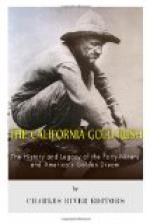THE VIGILANTES OF ’56
This execution naturally occasioned a great storm of indignation among the erstwhile powerful adherents of the law. The ruling, aristocratic class, the so-called chivalry, the best element of the city, had been slapped deliberately in the face, and this by a lot of Yankee shopkeepers. The Committee were stigmatized as stranglers. They ought to be punished as murderers! They should be shot down as revolutionists! It was realized, however, that the former customary street-shooting had temporarily become unsafe. Otherwise there is no doubt that brawls would have been more frequent than they were.
An undercurrent of confidence was apparent, however. The Law and Order men had been surprised and overpowered. They had yielded only to overwhelming odds. With the execution of Cora and Casey accomplished, the Committee might be expected to disband. And when the Committee disbanded, the law would have its innings. Its forces would then be better organized and consolidated, its power assured. It could then safely apprehend and bring to justice the ringleaders of this undertaking. Many of the hotheads were in favor of using armed force to take Coleman and his fellow-conspirators into custody. But calmer spirits advised moderation for the present, until the time was more ripe.
But to the surprise and indignation of these people, the Vigilantes showed no intention of disbanding. Their activities extended and their organization strengthened. The various military companies drilled daily until they went through the manual with all the precision of regular troops. The Committee’s book remained opened, and by the end of the week over seven thousand men had signed the roll. Loads of furniture and various supplies stopped at the doors of headquarters and were carried in by members of the organization. No non-member ever saw the inside of the building while it was occupied by the Committee of Vigilance. So cooking utensils, cot-beds, provisions, blankets, bulletin-boards, arms, chairs and tables, field-guns, ammunition, and many other supplies seemed to indicate a permanent occupation. Doorkeepers were always in attendance, and sentinels patrolled in the streets and on the roof. Every day the Executive Committee was in session for all of the daylight hours. A blacklist was in preparation. Orders were issued for the Vigilante police to arrest certain men and to warn certain others to leave town immediately. A choice haul was made of the lesser lights of the ward-heelers and chief politicians. A very good sample was the notorious Yankee Sullivan, an ex-prize-fighter, ward-heeler, ballot-box stuffer, and shoulder-striker. He, it will be remembered, was the man who returned Casey as supervisor in a district where, as far as is known, Casey was not a candidate and no one could be found who had voted for him. This individual went to pieces completely shortly after his arrest. He not only confessed the details of many of his own




